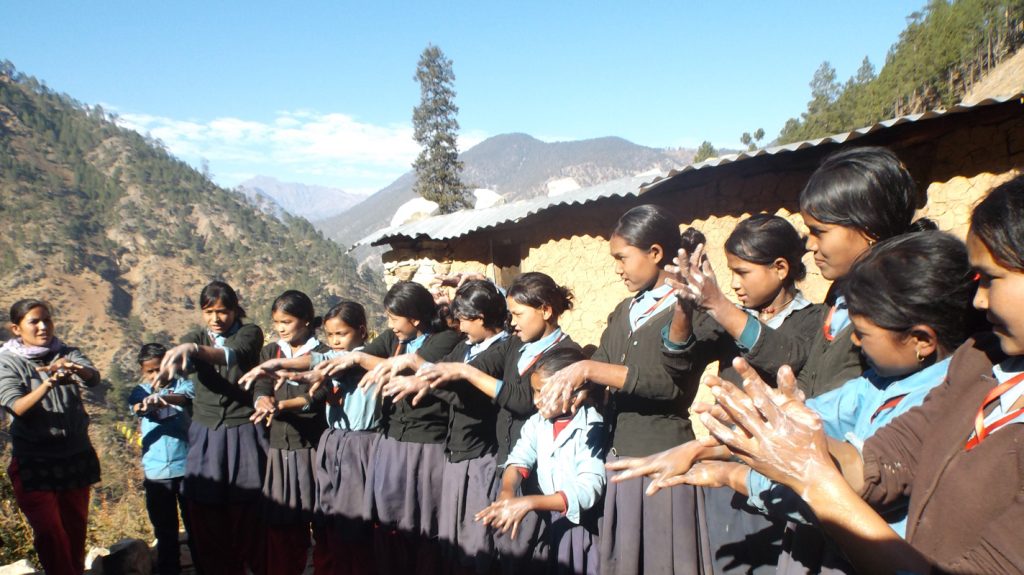Project community:
Bajura District in Western Nepal
PHASE implemented a two-year focus programme on diarrhoeal disease control and treatment in 5 VDCs (Village Development Committees) in Bajura district. This project is linked to other PHASE projects in the Karnali region (Humla, Bajura and Mugu districts), which aim to provide basic health services to the population in one of the most remote areas of Nepal.
The project comprised extensive education and information measures, training for staff in government health posts, training for multipliers (mothers’ groups, voluntary helpers) and information events and poster campaigns for the population. Special attention is paid to preventing the transmission of infectious diarrhoeal diseases (sanitary measures, simple water treatment) and education on the treatment of diarrhoeal diseases.
This programme will improve the life chances and health of a total of 25,000 people in the target area.
Originally, two other VDCs were planned for the project (Rugin and Kotdanda in Mugu district), but in the course of concrete project planning it became clear that the distances would practically mean a great loss of time for the project. In addition, the exchange of these two VDCs with Baadu and Kotila has the advantage of increasing the target population by 3,500 people.

Context: Bajura and Mugu region
The region is one of the most underdeveloped and remote in Nepal: in the district ranking of development, the districts are 71st and 73rd (out of 75), most of it is classified as high mountains, there are no passable roads. The region was badly affected in the last civil war, and recovery of the destroyed infrastructure is slow. Inadequate irrigation, poor soils and vulnerability to climate change or natural disasters make this one of the most food insecure regions in the world. In a 2008 survey, only 14.5% of respondents said that vegetables were eaten in their family, and only 5.5% knew what malnutrition meant. Out-migration leads to labour shortages in villages, which increases the burden on those who stay (mainly women) and results in cultivable land lying fallow. On national average, skilled attendants are present at 19% of births; in the region (with the exception of communities in the catchment area of PHASE-run health centres), the figure is close to 0%. There is very limited access to family planning, most families do not have a year-round safe water supply or sanitation facilities.
The region was heavily affected by the ten-year armed conflict, which made the situation worse: Most of the target region was inaccessible to government services, and the transport situation became even worse. High seasonal labour migration leaves the population vulnerable to sexually transmitted diseases and HIV. Most people are not aware of regular medical care and do not know what to expect and demand.
The central location of the target region, Kolti in the district of Bajura, is accessible by air but not by road. The Primary Healthcare Centre that exists there should be equipped with a doctor and several other medical assistants as well as laboratory and administrative staff. In fact, there was never enough trained staff on site, there are no such services. The town is centrally located in a relatively densely populated area and is the starting point for the planned project.
The project is in the context of already ongoing and planned PHASE projects in the region: Since March 2008, PHASE has been running health posts in Humla in two communities (VDCs – Village Development Committees) with a focus on obstetrics, maternal health and young children. Mortality from annual diarrhoeal epidemics was also high in these communities: 25 adults died in the summer of 2007. Since the PHASE project began in March 2008, not a single such death has been recorded in these communities, despite frequent outbreaks of infection.
From mid-2013, PHASE Nepal is planning a project there that will address this situation: after an assessment in the target communities, the Primary Helathcare Centre will be rebuilt and staffed (health assistant, nurse, four other medical staff), and included in the existing exchange programme with British GPs (general practitioners), so that highly qualified GPs also contribute to staff training for about 2 months a year. A partnership with a Nepalese medical college (Chitwan Medical College) also promises the regular presence of fully trained Nepalese doctors.
According to the 2011 Nepalese census, the population of the target area for the new project is as follows:
| DISTRICT | VDC | HOUSEHOLDS | POPULATION |
|---|---|---|---|
| Bajura | Kolti | 1.330 | 7.134 |
| Bajura | Rugin | 522 | 2.914 |
| Bajura | Pandusen | 1.184 | 6.171 |
| Bajura | Bai (Wai) | 628 | 3.383 |
| Mugu | Kotdanda | 301 | 1.812 |
In this region, life expectancy is 10 years below the Nepalese average (data: ICIMOD, 2003). One of the identified problems is periodic epidemic diarrhoea – in 2009, 400 people died of infectious diarrhoea in the region within one month. The population has virtually no access to safe drinking water and sanitation (toilets).
The project was completed in November 2015, here you can find the PHASE Austria project report.
This project was made possible by funding from the Department of Foreign Affairs of the City of Vienna as part of the 2013 Global Health Call.


